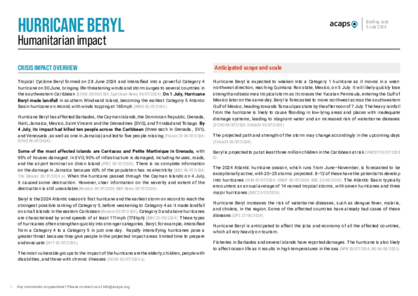As at November 2023, approximately 44,800 Venezuelan migrants, refugees, and asylum seekers were living in Trinidad and Tobago. This number represented the highest per capita population of Venezuelans in the Caribbean as at 2024, with the islands having a total population of 1.5 million.
Most Venezuelan migrants lack access to regular status and are susceptible to increased immigration detention, deportation, and the risk of refoulement, especially for those registered after the implementation of the 2019 Migrant Registration Framework.
Children represent a significant proportion of refugees and migrants: 85% of those registered with UNHCR are Venezuelan. Their protection needs are particularly acute.
Sea routes used by migrants to reach Trinidad and Tobago expose them to protection and safety risks. There have been reports of boats shipwrecked on the way to the islands.
Venezuelan migrants have also denounced cases of human trafficking and child labour both during their journey and after arriving in the country. Migrants with irregular status face protection risks related to discrimination, deportation, and xenophobia. The inability to access legal status limits their livelihood and job opportunities.
(R4V 02/12/2023, AI 17/08/2023, UNHCR 24/01/2022, TC 18/01/2023)
As at November 2023, approximately 44,800 Venezuelan migrants, refugees, and asylum seekers were living in Trinidad and Tobago. This number represented the highest per capita population of Venezuelans in the Caribbean as at 2024, with the islands having a total population of 1.5 million.
Most Venezuelan migrants lack access to regular status and are susceptible to increased immigration detention, deportation, and the risk of refoulement, especially for those registered after the implementation of the 2019 Migrant Registration Framework.
Children represent a significant proportion of refugees and migrants: 85% of those registered with UNHCR are Venezuelan. Their protection needs are particularly acute.
Sea routes used by migrants to reach Trinidad and Tobago expose them to protection and safety risks. There have been reports of boats shipwrecked on the way to the islands.
Venezuelan migrants have also denounced cases of human trafficking and child labour both during their journey and after arriving in the country. Migrants with irregular status face protection risks related to discrimination, deportation, and xenophobia. The inability to access legal status limits their livelihood and job opportunities.
(R4V 02/12/2023, AI 17/08/2023, UNHCR 24/01/2022, TC 18/01/2023)


